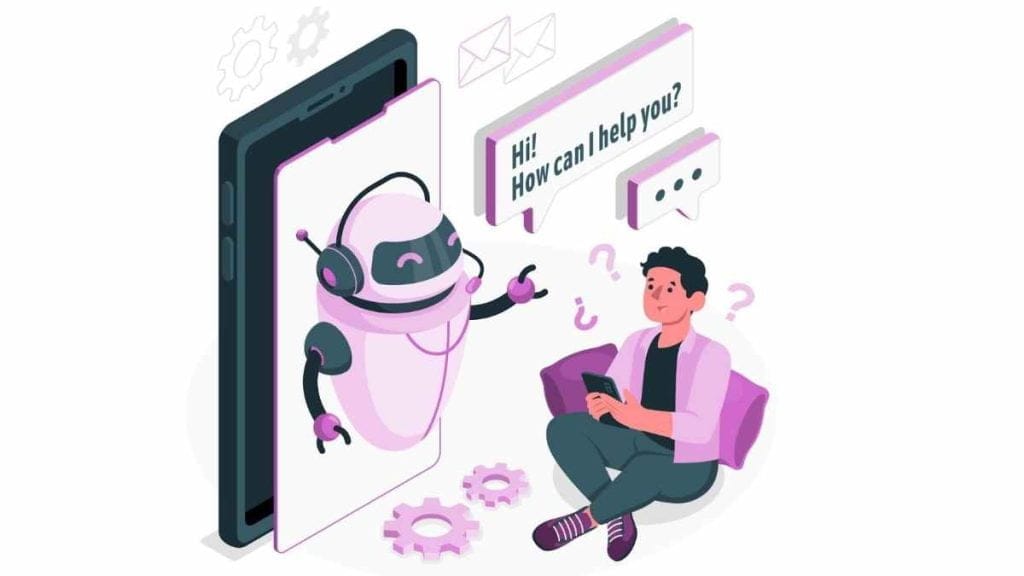Before the days of AI chatbots, you might remember your customer experience involving having to wait on the phone for hours or sifting through page after page of irrelevant FAQ entries.
Imagine a customer support representative that works 24/7, never tires, and can handle multiple inquiries simultaneously without any drop in quality. Sounds too good to be true? Not quite. In the world of AI, this super-employee exists, and it’s known as an AI Chatbot.
In this article, we’ll hone in on the technology behind AI chatbots, understanding their capabilities, their impact on enhancing the customer experience, and the five key benefits they offer.
Whether you are keen on understanding more about chatbots or have been considering implementing them into your website, you will want to stick around as we break down the 360-degree view of how these AI bots are transforming the customer experience.
What are AI Chatbots?
If you are like me, you probably hate the idea of not being able to get instant support when you need it. It’s frustrating, and more importantly, it can ruin the customer experience for businesses.
This is where AI chatbots have made headwinds for many companies’ customer experience and IT support. These intelligent software systems are designed to interact with humans in their natural language, providing immediate, personalized responses at any time of day or night.
Chatbots leverage two key technologies: Natural Language Processing (NLP) and Machine Learning (ML). NLP enables chatbots to understand human language, text, or speech and respond in a natural, human-like manner. Meanwhile, ML empowers them to learn from every interaction, thus improving the quality of their responses over time.
5 Benefits of AI Chatbots for Customer Experience
Artificial intelligence has become all the rage in the past year, and AI chatbots are no exception when it comes to improving customers’ experience. Let’s look at 5 of the best ways you can leverage AI to enhance customer service and experience.
24/7 Customer Support
Likely one of the largest use cases for companies is having 24/7 support with automated conversational agents. No more waiting for an email response or call back. Companies can now provide uninterrupted service to improve customer satisfaction and increase customer trust.
Proactive Customer Engagement
Leaning heavily on machine learning algorithms, AI-powered chatbots can not only interact but also initiate engagement with customers. These intelligent assistants analyze patterns in customer behavior from past interactions, allowing them to suggest relevant products or services and predict and preemptively address potential issues.
This proactive approach, fueled by machine learning, enhances efficiency and speeds up issue resolution.
Multilingual Support
The good thing about AI is that language restrictions do not bind it. That is assuming the model was trained with multilingual data inputs. These digital assistants can comprehend and respond in multiple languages extending your reach to non-English speaking customers and providing a more inclusive customer experience.
Personalized Experience
AI chatbots are capable of harnessing and analyzing extensive customer data. By deciphering trends, interests, and behaviors from historical and real-time data, they are able to generate personalized responses and recommendations. Interestingly, over half of consumers, 62% to be exact, favor the instant service provided by a bot over the potential wait time involved with human-assisted customer service.
Consistent Service
Unlike human customer service representatives who might have off days, digital customer support agents ensure steady, high-quality service every time. They remain unaffected by external factors, providing reliable and consistent support.
Challenges for Companies Using AI Chatbots
Navigating the world of AI and automated chatbots can be challenging for companies, particularly considering the technical intricacies involved. While these bots present numerous benefits, they also bring a unique set of challenges that businesses must be prepared to overcome.
- Data Security: AI chatbots deal with significant customer data, making them potential targets for data breaches. Ensuring robust security protocols is essential to protect sensitive information.
- Integration with Existing Systems: The process of integrating AI chatbots with a company’s existing systems can pose technical challenges, especially with legacy systems that are complex in nature.
- Development and Maintenance: The development of AI chatbots involves complex algorithms, and maintaining them requires continuous improvements and updates as per changing user needs and technological advancements.
- Natural Language Understanding: Despite advancements, AI chatbots can still struggle with understanding context and ambiguity in language, leading to less-than-optimal interactions if they do not feed proper queries.
With a sound understanding of these potential roadblocks, businesses can make informed decisions about implementing AI chatbots in their customer service strategies. It’s about turning these challenges into opportunities for technological advancement and customer service improvement.
Future Predictions: Potential AI Chatbot Use Cases
Looking ahead, the possibilities of AI chatbot applications seem nearly limitless, given the rapid pace of technological advancements. Let’s dive into a few innovative and imaginative, yet entirely plausible, use cases that might become a reality in the not-so-distant future.
- Smart Home Integration: Imagine AI chatbots integrated with smart homes, predicting your needs based on your daily patterns. For example, starting the coffee machine just as you’re waking up or suggesting a movie you’d like based on your viewing history.
- Psychological Counselling: AI chatbots could potentially be used as therapy bots providing psychological counseling, especially for those who may be hesitant to seek human interaction for their mental health concerns.
- Travel Assistance: In the future, AI chatbots could be your virtual travel guide, suggesting places to visit, booking accommodations, or even advising on local customs and etiquette based on real-time data.
The role of AI and chatbots is expected to expand while bridging gaps and introducing new ways of enhancing our day-to-day lives. There is so much exciting potential that’s just waiting to be tapped.
Conclusion
Artificial intelligence tools and machine learning chatbots, while not new to the technology scene, are making rapid strides to become an industry standard for companies. They’re not simply tools for answering customer queries – they’re shaping up to be trusted allies, providing solutions around the clock and creating personalized experiences that resonate with us on a deeper level.
Looking ahead, the potential use cases we’ve explored are just the tip of the iceberg. With advancements in technology, we’re set to witness bots becoming integral parts of our everyday life.
As we continue to innovate, one thing’s certain – the future of customer experience with AI bots is bound to be fascinating.
FAQ
A: AI chatbots are intelligent software programs that use artificial intelligence to engage in natural language conversations with users. They enhance customer experience by providing instant, 24/7 support, answering queries promptly, and guiding users through various processes. This leads to quicker issue resolution and seamless interaction, ultimately improving customer satisfaction.
A: AI chatbots analyze user data and previous interactions to tailor responses and recommendations to individual preferences and needs. Chatbots can offer personalized product suggestions, troubleshoot specific issues, and create a more personalized and relevant customer experience by understanding customer history and behaviour.
A: Yes, AI chatbots are designed to handle a wide range of inquiries, including complex ones. They can comprehend context, extract information, and provide detailed solutions through natural language processing and machine learning. While they may escalate certain queries to human agents, AI chatbots can often resolve intricate issues independently, reducing the need for customers to wait for human assistance.
A: AI chatbots operate 24/7 without breaks, ensuring round-the-clock availability for customers. They instantly respond to inquiries, eliminating the need for customers to wait for human agents during peak hours or off-hours. This immediacy in response times enhances customer satisfaction and helps resolve issues more efficiently.
A: AI chatbots streamline customer support operations by handling routine and repetitive tasks, allowing human agents to focus on more complex and strategic tasks. This leads to improved operational efficiency and cost savings, as fewer human resources are required for basic inquiries. Additionally, AI chatbots can simultaneously serve multiple customers, reducing wait times and increasing efficiency.

